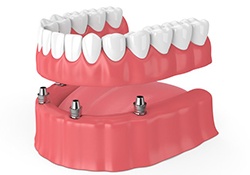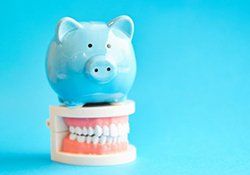Dental Implants – New Lenox, IL
State-of-the-Art Tooth Replacement That Lasts for Life
Losing natural teeth can be devastating, but it certainly doesn’t have to be permanent as well. At Atrium Family Dental of New Lenox, Dr. Albert, Dr. Snow, and Dr. Stylski proudly offer a tooth replacement service that’s revolutionary in nature: dental implants. While traditional options have only focused on recreating the white crown of a natural tooth, dental implants go an important step further by starting with the root that’s well-hidden in the jawbone. This comprehensive approach establishes a lasting foundation for the brand-new tooth, prioritizing oral health in addition to function and aesthetics. The final product is virtually indistinguishable from natural dental structure in every way!
Here in New Lenox, we’re proud to offer every stage of transformative dental implant treatment right here in-office, including the surgical components. Please contact us today if you’re interested in scheduling a consultation.
Why Choose Atrium Family Dental of New Lenox for Dental Implants?
- Dental Implant Placement & Restoration Completed Under One Roof
- Advanced Cone Beam Technology for Precise Treatment Planning
- Evening & Saturday Hours Available
What Are Dental Implants?

A dental implant is a small titanium post that is meant to mimic the root structure of a missing tooth. During oral surgery, the post is placed into your jaw. Over the course of a few months, the jawbone actually grows around the implant until it essentially becomes a part of you. Then, a metal connector called an abutment is placed atop the implant. The abutment allows us to attach the custom-made restoration, which can be a crown, bridge, or denture depending on how many teeth you’ve lost.
Because dental implants are the longest lasting and most comprehensive solution to tooth loss, most dentists (including ours) consider them the gold standard for completing your smile.
The 4-Step Dental Implant Process
At Atrium Family Dental of New Lenox, you can feel confident knowing that your dental implant placement will be completed in-house by a team of specialized dentists. Not only does this make the process more convenient, but it will also help you to feel more comfortable and confident in your decision to pursue dental implants to replace your missing teeth. From the initial consultation with one of our esteemed dentists to the placement of your finalized restoration, the entire process does take time and patience, but once you see the results, you’ll discover it was well worth the wait.
Initial Dental Implant Consultation

The first stage of the dental implant process includes a consultation with one of our dental experts. After reviewing your oral and overall health, they will assess your jawbone density to determine if it is strong enough to serve as a solid foundation for your implants. If so, we will take impressions of your oral cavity, which will be sent to lab technicians who will customize your dental restorations. Whether you need a dental crown, implant bridge, or implant denture, they will make sure it matches the size, shape, and color of your other natural teeth.
Dental Implant Surgery

The actual placement of your dental implants will occur in-house, as one of our dentists will surgically place each individual post into your jawbone. Before the placement, you will receive anesthesia to eliminate any possible pain or discomfort while ensuring you are comfortable throughout the procedure.
The number of incisions in your gums will be determined by the number of implants you need to be placed. Once they are properly positioned, the surgical sites will be closed, and you will return home to recover for the next three to six months.
Dental Implant Osseointegration/Abutment

As you spent time recovering at home, the process of osseointegration will occur. This is when the implants must fuse with the jawbone and the surrounding tissues. Once this step is complete, you will return for a scheduled appointment to have your abutments put into place. These are the metal appliances that connect your implants to your restoration.
Delivery of Dental Implant Restorations

The final stage of the dental implant process in New Lenox is to have your customized restoration put into place. Once our office receives the finalized prosthetic, our team will look it over to make sure it meets the desired specifications. If so, we will secure it into place, giving you the results that you’ve been waiting to see – a full, complete smile.
Benefits of Dental Implants

Over the past several years, dental implants have become the treatment of choice to replace teeth among dentists and patients alike. Why? Simply put, the benefits of traditional tooth replacements simply can’t compare to those offered by dental implants. Below, you can read about these benefits in greater detail and gain a more thorough understanding of why so many people are choosing dental implants to replace missing teeth, rebuild their smile, and achieve better long-term oral health!
Day-to-Day Benefits

- Dental implants are extremely aesthetic in nature and highly functional. It is very likely that patients will simply forget they’re not natural teeth after some time has passed.
- Taking care of dental implants is a relatively easy endeavor. Brushing twice a day, flossing daily, and visiting our office twice a year for a checkup are all patients need to do to keep harmful plaque and bacteria off of their dental implants and ensure they remain healthy.
- If you’ve ever been concerned about being able to speak clearly, dental implants are sure to give you a boost in confidence. This is because they will not shift out of place while speaking like dentures frequently do.
- Want to enjoy your favorite foods? Now you can with total confidence. Dental implants have no trouble tearing and breaking down all sorts of foods, including tough, chewy, and crunchy varieties that would otherwise be impossible to eat with traditional dentures.
Health Benefits

- Dental implants don’t require remaining healthy tooth structure to be removed or negatively impacted. Their conservative nature can help your smile thrive for many more years to come.
- Tooth loss can lead to remaining teeth shifting out of place, causing the bite to become misaligned. With dental implants, remaining teeth stay where they are supposed to and prevent gaps and crowding from developing.
- When a tooth is lost, the likelihood that additional teeth need to be extracted only goes up. This is because the foundation necessary to keep teeth healthy is reduced every time a tooth is removed. With regular stimulation from a dental implant, your remaining teeth can remain healthy and functional.
Long-Term Benefits

- Dental implants are the only reconstructive service available today that successfully prevents jawbone deterioration, which is a common concern following tooth loss. By replacing the roots first, the tissue is stabilized and stimulated for optimal health benefits.
- The longevity of dental implants is definitely unmatched. They’re designed to last for several decades at a time or even the rest of the patient’s life.
- When you want a tooth replacement you can rely on, you’ll appreciate the incredible success rate dental implants maintain. For example, their average success rate for healthy patients falls between 95% and 98%, even after 10 years of use.
Who Dental Implants Can Help

Whether you have a single gap in your smile or you’re missing virtually every natural tooth, dental implants could be the ideal treatment method for you. Because they bring back the root structure of a tooth instead of just its crown, they make a great option for patients who have lost any number of teeth. The exact details of your treatment will vary based on the extent of your tooth loss, but generally, most healthy adults are eligible for this innovative solution. Keep reading to find out if you qualify for dental implants in New Lenox.
Who Is a Good Candidate for Dental Implants?

Virtually any adult who is in generally good health and has lost teeth makes a good dental implant candidate. Even if you’re unsure, it couldn’t hurt to schedule a consultation with our dentists to find out. They’ll closely examine your mouth and go over your medical history to determine whether you can receive dental implants right away or if you require certain preliminary treatments first.
During your dental implant consultation, we’ll typically look for three factors:
- Good oral health – Gum disease or decay in your remaining teeth could jeopardize the success of your new teeth. If we detect these issues, we may need to perform periodontal therapy or tooth extractions before dental implant placement.
- Decent overall health – Your general health must be well enough to undergo minor oral surgery. However, if you have an autoimmune disease or some condition that complicates healing, you may need to talk to your primary care physician about ways to reduce your risk.
- Sufficient jawbone density – If your jawbone has deteriorated after tooth loss, it may not be able to support the implant posts. Bone grafting can strengthen the area and give your implants a healthy foundation.
Once you’re ready to move forward with the treatment process, your dental implant dentist in New Lenox will develop a reconstructive plan based on the number of teeth you have lost.
Missing One Tooth

If we need to recreate one tooth, a single dental implant can be paired with an all-porcelain crown. Unlike with a traditional dental bridge, the crown’s placement won’t require any negative alteration of the natural teeth around it. Plus, it should blend in beautifully with the rest of your smile.
Missing Multiple Teeth

To replace several missing teeth in a row, we can use an implant-supported bridge. Our dentists will place two dental implants, one on either side of the empty space. The bridge is then securely anchored to them, replenishing biting strength and preventing surrounding teeth from gradually drifting out of place. For multiple missing teeth that are not consecutive, a small number of strategically placed implants can secure a partial denture into place.
Missing All Teeth

Even an entire arch of teeth can be brought back with dental implants. A personalized full denture can be attached onto as few as four implant posts placed at precise locations and angles throughout the jaw. Because your new teeth are firmly secured, you won’t have to worry about the annoying slippage and messy adhesives that you would with traditional dentures.
Learn More About All-on-4 Implants Learn More About Implant Dentures
Understanding the Cost of Dental Implants

What will you end up paying for dental implants in the end? The cost is well worth the investment in improved oral health, boosted confidence, a dazzling appearance, and an overall increase in the quality of your life. As for the exact price, there are many different aspects of the implant procedure that we’ll need to take into account before we can give you any useful numbers. Below is an outline of the topics we’ll need to touch on when figuring out implant costs.
Preliminary Treatments & Dental Implant Surgery
Do you have gum disease that could ultimately lead to dental implant failure? Has your jawbone lost too much tissue to support implant posts? Are the teeth that need to be replaced still in your mouth? If the answer to any of these questions is yes, then preliminary treatments will need to be performed as part of the implant process, and that can increase cost.
Once the time has come for the implant surgery itself, it’s important to note that the use of anesthesia can affect the cost of the procedure. Also, since a separate specialist will be performing the implant placement, the fee for the surgery will be separate from the fee of the restoration, so keep that in mind.
The Parts of Your Dental Implant
The individual components of implants, the material they’re made of, the manufacturer used, and the total number of implants needed will greatly influence the final cost. The most common material for dental implants is titanium; its durability gives it a long lifespan despite the daily stress that you’ll put it through when you bite and chew, and its biocompatibility greatly increases the odds of a successful procedure.
Final Dental Implant Restoration
What kind of dental implant restoration are you getting? Do you need:
- A single implant-retained crown to fill in just one gap?
- A dental bridge along with two dental implants in order to replace several teeth in a row?
- A partial implant denture that fits into multiple gaps throughout the smile like a puzzle piece?
- A full implant denture that is held permanently in place by up to 8 implant posts?
Different restorations are better suited for different kinds of tooth loss, and the kind you get will affect the amount you end up paying.
Does My Dental Insurance Cover Dental Implants?
Most of the time, the answer is no. Many insurance plans still classify dental implants as an elective procedure and thus won’t cover them. However, there are some exceptions, and we can go over your benefits with you to see what’s offered under your specific plan. We can also help determine if you’re eligible for coverage for preliminary procedures or portions of the restoration.
Making Dental Implants Affordable
With our Smile Saver Club, you can enjoy a 10% discount on most of our services, which can include implant-related treatments. Also, our practice works with CareCredit – a third-party company that lets you break up the cost of your care into a series of smaller payments. Learn more about your options.
Advanced Dental Implant Procedures

During your initial consultation, we’ll review a CT scan of your oral structures to ensure there aren’t any hidden issues that might cause complications with the success of your new smile. Based on the results of the scan, you might need additional procedures before your dental implant placement surgery, like bone grafting or a sinus lift. They are often needed for patients who have experienced bone loss. Although it will add another step to your treatment, it’s essential for ensuring your new smile lasts for many years.
Bone Grafting

If you’ve lost bone matter in your jaw, the dental implant integration process won’t be successful. Ultimately, it will lead to implant failure if the problem isn’t corrected. Bone grafting and dental implants often go hand-in-hand to resolve the issue.
You’ll need a minor surgical procedure to open your gum tissue to access your jaw. Bone is taken from another site or a donor and grafted to the area that is weak. Over the next several weeks, the graft integrates with your jaw to enhance its strength. After you’ve healed, your jaw will be strong enough to support your dental implant.
Sinus Lifts

Also known as a sinus augmentation, the surgical procedure increases the height of your bone by the maxillary sinuses located on either side of your nose. This is often needed for patients who have lost their molars and want to replace them with dental implants.
Your gum tissue is opened to allow a small oval to be cut into your jaw. Your sinus is moved upward, and a graft is placed into the hole. Your jaw and the graft will heal over the next several weeks. Once you’ve fully recovered, you can undergo your placement surgery.
Dental Implants Post-Op Instructions

Dental implants are the best tooth replacement option out there. Since they replace the roots of the missing teeth, they allow for a wide range of benefits that you can’t achieve with dentures or dental bridges. To get these benefits, getting dental implants involves a multi-step process that takes place over the course of several months. We will provide you with detailed dental implant post-op instructions. They will look something like this.
What to Do Directly After Dental Implant Surgery

The most important part of your dental implant recovery is to leave the blood clot at the surgical site completely undistracted. This clot is needed for the area to heal properly. Here are some things that you should avoid to keep this clot in place.
- Spitting: Swallow your saliva or use a tissue.
- Straw: The structure of the straw can dislodge the blood clot.
- Smoking: Don’t smoke following your procedure.
- Touching: Keep your tongue and fingers away from the surgical site.
Common Side Effects When Recovering from Dental Implant Placement

Side effects are common and to be expected following dental implant placement surgery. Here are some that you might run into.
- Bleeding: Minor bleeding during the recovery period is common. This can be reduced with clean gauze and light pressure.
- Inflammation: For the first 72 hours after your procedure, you may have some inflammation. This can be lessened with a cold compress.
- Discomfort: Soreness is common following dental implant surgery. This could be managed with your over-the-counter and prescribed pain reliever.
Your Diet After Dental Implant Surgery

After your procedure, it is ideal to stick to softer foods, so you don’t aggravate the surgical site. Here are a handful of suggestions.
- Scrambled eggs
- Oatmeal
- Mashed potatoes
- Pasta
- Soup
- Yogurt
- Applesauce
- Ice cream
- Pudding
Post-Op Health & Oral Hygiene

The day following your surgery, brush your teeth and floss as you normally would. Be especially careful to avoid the dental implant site. To keep the area clean, gently rinse your mouth with salt water after your meals. When you pick out mouthwash, choose one that doesn’t contain alcohol. This is because alcohol can irritate the surgical site and cause discomfort.
What to Do After Your New Teeth Are Attached

After your replacement teeth are secured to your dental implants, the difficult part is done! You might experience some slight discomfort and sensitivity as your mouth adjusts, but this should be easy to manage at home. At this point, you shouldn’t run into any swelling, bleeding, or extensive recovery. If you have concerns or questions regarding your post-op instructions, let us know so we can help.
Maintaining & Caring for Your Dental Implants

One of the main reasons why millions of Americans currently have dental implants is their remarkable potential for longevity. With an impressive success rate of more than 95%, your implants could last for 30+ years or maybe even a lifetime! However, this only happens if you take good care of them. Fortunately, dental implant care in New Lenox is fairly straightforward. Just follow these five simple steps.
Make Oral Hygiene a Priority

Even if all of your teeth have been replaced by dental implants, good oral hygiene is still essential. While the implants are cavity-proof, plaque and bacteria can still accumulate in the gum tissue supporting the posts, leading to implant failure. You can easily prevent this by:
- Brushing your teeth (real and artificial) twice a day for two minutes each time
- Flossing between all of your teeth at least once per day
- Rinsing with an antimicrobial mouthwash regularly
Eat a Healthy Diet

Because dental implants renew almost all of your original biting power, you should easily be able to enjoy a full, nutritious diet. That said, you should still limit or avoid certain foods. Chewing on extremely hard items like nuts or hard candies can chip or wear down your restoration. Sticky foods like gummy candies can loosen or dislodge your restoration from the implant. Lastly, overindulging in sugary treats can increase your risk of gum disease, which may compromise your implants.
Break Bad Habits

Now that you have dental implants in New Lenox, it’s the perfect time to quit harmful oral habits, such as:
- Smoking or chewing tobacco – Not only does tobacco use slow down the healing process (making it harder for your implants to fuse to your jawbone), but it more than doubles your risk of gum disease.
- Chewing on hard items – If you chew on ice cubes, pen caps, pencil tips, or your fingernails, you could end up weakening your dental implant and damaging the restoration.
- Using your teeth as tools – Opening a long-awaited package or a yummy-looking bag of chips with your teeth may seem convenient, but one wrong move could severely harm your implant. Always keep a pair of scissors in easy-to-reach places so that you’re not tempted to use your pearly whites instead.
Protect Your Dental Implants

While dental implants are made from highly durable titanium, they’re not indestructible. A sports-related injury to the face could fracture your restoration or even knock your implant out of place. Safeguard your new smile by wearing a custom mouthguard during sports games and practices.
Similarly, you should also protect your teeth from bruxism, or chronic teeth grinding and jaw clenching that often occurs at night. Over time, this pressure can wear down your implants and restorations. Luckily, we can craft you a custom nightguard to shield your teeth.
Schedule Regular Dental Checkups

No matter how many natural teeth you’ve lost, you should still see your implant dentist in New Lenox at least twice a year for a routine checkup and cleaning. This gives our team an opportunity to clean and examine your implants and remaining teeth. If we spot any signs of trouble, like damage or infection, we can treat them early on, saving you time and money in the long run!
Dental Implant Failure & Salvage

Dental implants are consistently successful; they thrive in more than 95% of cases! However, there is always a slight possibility that something could go wrong. Infections or injuries could lead to dental implant failure. If you ever believe that one of your implants is not as healthy as it should be, contact our team right away. We will carefully evaluate the situation and recommend your next steps. Our goal is to design an efficient treatment plan that will restore your smile’s wellness as soon as possible.
Learn More About Dental Implant Failure & Salvage
Dental Implant FAQs

Are you sick and tired of not being able to speak and eat like you did when you had all of your natural teeth? With dental implants, your implant dentist in New Lenox can rebuild your smile and make your life easier by bringing back the entire structure of your lost teeth. To give you a better idea of what to expect during the process, we’ve answered some frequently asked dental implant questions below. If you don’t find your question here, don’t be afraid to reach out to our team at Atrium Family Dental of New Lenox and ask!
How Long Does It Take to Get Dental Implants?
While the answer is different for everyone, the dental implant process typically takes somewhere between several months and a year. If you require preparatory work, such as a sinus lift or bone grafting, that can add a few months to your total treatment time, but it’s ultimately worth it to ensure your new teeth have a healthy foundation. During your consultation, we can lay out a personalized timeline for you.
Once the implant posts have been placed, it generally takes between three and six months for them to integrate with your jawbone and surrounding tissues. After that, you’ll undergo another, smaller surgery in which we place your abutments (metal attachments that connect your implants to your restorations). Recovering from that procedure takes another couple of weeks, after which we can finally place your custom-made crown, bridge, or denture.
Does Dental Implant Surgery Hurt?
Getting titanium posts inserted into your jawbone may sound painful, but rest assured that we do our utmost to maximize your comfort. We’ll ensure the process is as painless as possible by administering anesthesia to numb your mouth and relax you. While your mouth may be sore for a few days afterward, the procedure itself should not hurt.
Will I Have to Take Time Off from Work to Get Dental Implants?
In most cases, we recommend taking at least one day off from work to recover after your dental implant surgery. You probably won’t feel like doing much after the procedure besides resting, especially if you received sedatives.
For the first several days, it’s a good idea to avoid strenuous exercise, as it diverts much-needed blood from the healing site. Therefore, if your job requires significant physical labor, we suggest asking for at least three days off, or scheduling your procedure on a Thursday or Friday. That way, you’ll have plenty of time to rest.
How Long Do Dental Implants Last?
With the right care and maintenance, dental implants in New Lenox can last for 30+ years. That’s more than three times longer than conventional dentures or bridges. Here are some tips to maximize the lifespan of your new smile:
- Keep up with a routine of daily flossing and twice-a-day brushing.
- Schedule and attend a checkup and cleaning with us at least once every six months.
- Avoid chewing foods that are overly hard, chewy, or sticky.
- Maintain a healthy diet.
- Protect your teeth from grinding by wearing a nightguard.
- Wear a mouthguard whenever you play sports.
- Refrain from using tobacco products.
Are There Any Diet Restrictions after Getting Dental Implants?
In the immediate aftermath of having implants surgically placed, you will need to follow our dietary instructions. For the first few days, avoid using a straw because the sucking motion can interfere with the site’s healing. During the first couple of weeks, you’ll need to stick to a soft foods diet, consisting of applesauce, mashed potatoes, eggs, bananas, and the like to give the surgical sites enough time to recover. After that point, you can start to reintroduce normal foods as tolerated.
However, after your implants have had restorations attached to them, you are free to eat basically anything you like. Just make sure you’re not biting down on hard things like ice, popcorn kernels, and the like. Otherwise, you can enjoy a juicy steak, raw carrots, and much more with your new teeth.
Will I Be Able to Remove My Prosthetic Teeth?
While some people want their prosthetic teeth to stay in forever, others like having the ability to take out their dentures if necessary. If you wish to be able to remove your implant dentures, we can use a special abutment that acts like a snap. You just need to tell us that you’d prefer this capability. Otherwise, your implant dentures will be bonded in such a way that only one of our dentists will be able to take out your replacement teeth.
How Long Is the Dental Implant Process?
The timeline for implant treatment will greatly vary from patient to patient. For some, it can take about six to eight months. For others, the process may stretch to a year because of other procedures involved in their treatment plan. Following your implant placement, we must wait about six months for the jawbone to surround the implants, and then our dental lab will need several weeks to create your custom restoration. During your consultation, we can break down the expected time frame for your implants and plan how long the process may take in your case.
How Does the Practice Use the Latest Technology for Dental Implants?
At Atrium Family Dental of New Lenox, we take advantage of cutting-edge technology to improve the patient’s experience and to enjoy more successful treatment. During the planning stage, we take 3D scans of your oral cavity with our CBCT scanner. This model gives us a more comprehensive view of what can’t be seen with the naked eye. It reveals not just teeth and bones but also blood vessels and nerve endings. As a result, we can plan exactly where to place the implants to avoid complications. When you’re ready for your restoration, we use a TRIOS digital scanner to take impressions. Unlike putty impressions, this device fits comfortably in your mouth and takes measurements with greater precision and accuracy.
